Mary has requested that the daily message be given each day
to the world. It is read nightly at the prayer service from her Image Building in
Clearwater, Florida, U.S.A. This is according to her request. All attempts will be made to
publish this daily message to the world at 11 p.m. Eastern time, U.S.A.
We acknowledge that the final authority
regarding these messages rests with the Holy See of Rome.
|
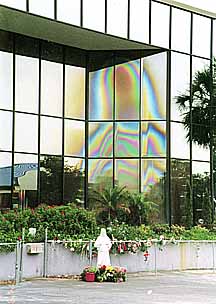 |
December 4, 2000
A Prayer for Intimacy
with the Lamb, the Bridegroom of the Soul
Oh Lamb of God, Who take away the sins of the world, come and act
on my soul most intimately. I surrender myself, as I ask for the grace to let go, to just
be as I exist in You and You act most intimately on my soul. You are the Initiator. I am
the soul waiting Your favors as You act in me. I love You. I adore You. I worship You.
Come and possess my soul with Your Divine Grace, as I experience You most intimately.
Messenger: Include Our Lady of the Holy Spirit
Center in 6:20 prayers.
Messenger: On December 17, 1996, the Red Rosary Book was
shipped from the publisher.
On December 17, 1996, Mary appeared on the building.
Shipped
December 17, 1996 |
Mary appeared
December 17, 1996 |
Rainbows match.
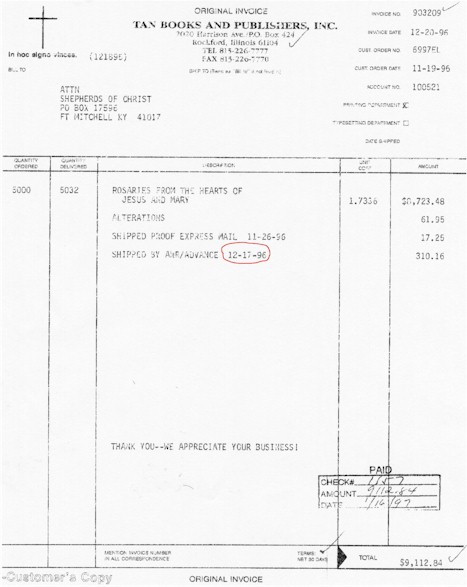
December 4, 2000 - Second Message
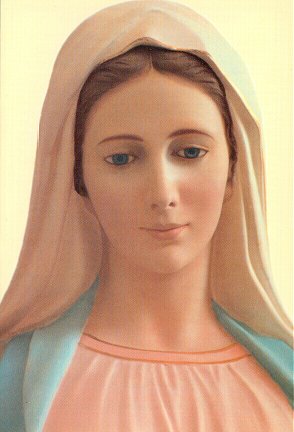
Mary speaks: Today December 4, 2000,
I ask you to publish my Blue Rosary Book and reprint the Red Rosary Book
for the 17th of December.
Help me please.
I love you, Mary.
December 4, 2000 - Third Message
Mary speaks: I ask my Blue Rosary Book be published for
December 17, 2000.
I request strongly that Red Rosary Books always be made available. Please they
have been out of print for many months because of funds.
All the money in this world and you will not help me get my Rosary Books into the hands
of the hungry.
Please help me.
Here is a message my Son gave on the Feast of the Sacred Heart.
Excerpt from June 30, 2000 Daily Message
June 30, 2000 - Second Message
Given June 29, 2000 - during 6:20 prayers
A MESSAGE FROM JESUS AND MARY
(Daily Message for the Feast of the Sacred Heart)
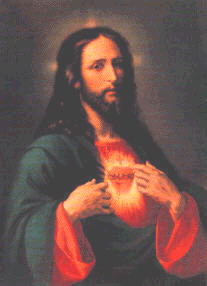
Jesus speaks: I desire the 6:20 format in the second
Rosary Book that your Mother wished compiled.
It will follow directly as I indicated, in the February 23, 1999 daily
message, putting together - the Jiffy Sheet, the Holy Spirit Novena Book and the Prayer
Manual. All prayers will follow as the format goes. Scripture will be included at the end.
Small updated sheets will always be available so that many can continue the prayers daily.
I am Jesus, the Savior of the world. This is a gift from Us, Rosaries from the Hearts of Jesus and Mary.
Your Mother wishes the original art work be used for the cover. The cover
of this book will be blue, both back and front cover, including the binding.
Included in this book will be all songs, Bring Me Souls, Our Lady of
Clearwater and Jesus, I Want to Be With You.
The cover must be blue.
It will be called Rosaries from the Hearts of Jesus and Mary, Volume
2, but will include rosaries of varying lengths as you are directed. The pictures of
Our Lady of the Holy Spirit Center windows must be included, Stations and the Seven
Sorrows.
Mary speaks: I am Mary, your Mother. I wish this to be
compiled as soon as possible and ready for distribution, publication should be soon. I
want this to be done with great beauty and from Tan or Banta depending upon the
availability and funds. Your request to the people should be to help with this
publication.
It will be most convenient to use this Rosary Book during the 6:20
prayers.
How to pray the rosary must be included.
Pictures of the building in Florida will be included.

Mary speaks: Very short and very long rosaries, rosaries of medium
length will be contained in this book.
You may refer to this as my Rosary Book, blue in color.
I wish the Red Rosary Book to include the format as directed here
for the 6:20 prayers. This will help all peoples praying these prayers and using the
rosary meditations from Our Hearts.
I am Mary, your Mother. I love you so much.
I want you to pray the rosary.
Advertisements for all books, tapes and publications for the school rosary
program should be included in the back of the book.
Directions given to all my sites and the sale of image rosaries must be
made available. I wish an order form to be placed there for this purpose.
I love you.
This is a gift we give to you in honor of Our special Feasts, June 30,
2000, Feast of the Sacred Heart, July 1, 2000, Feast of the Immaculate Heart of Mary.
Amen.
May God bless you abundantly.
I am Mary, your Mother, Mother of all.

Mary speaks: This message needs to be in the book.
(End of Excerpt from June 30, 2000 Daily Message)
Mary speaks: On the day July 5, 2000, you received these beautiful pictures
—
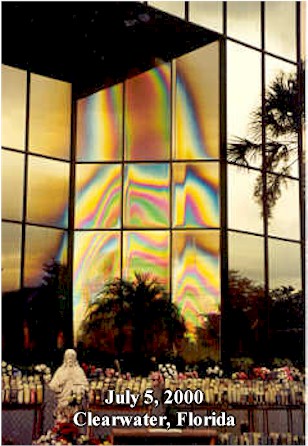
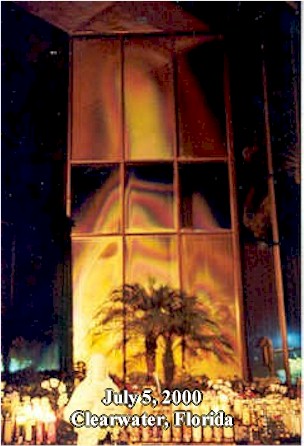
Mary speaks: And I turned gold for you my children, appearing in brilliant light
—
Here is the message I gave July 5, 2000.
I wish this message given July 5, 2000, in the front of my Blue Rosary Book
with rainbow and rose.
Excerpt from July 5, 2000 Daily Message
Rosaries from the Hearts of Jesus and Mary, begun July
5, 1994
Messenger: God is in control!!
When we do things, there is a result, so we plan and try
our best to do all that we can right.
What we fail to recognize many times is the hand of God
working in our lives.
We pray to Him and we must trust in His loving goodness.
TRUST IN GOD.
Jesus speaks: I do not wish to spend the whole
message today unveiling the workings of the evil one in your lives. There are top of the
mountain messages, where I take you to the summit of the mountain and open a door for you
and reveal about My love. There are messages dealing with the devil, who like a thief in
the night comes and sows weeds in the field with the good seed. There are directions I
give to you teaching you how to pray, directions I give for the Movement. I write for My
Church and My world. My Mother writes as a mother helping her little children to grow in
the spiritual life teaching them about God, teaching them how to pray, teaching them about
love and warning them of upcoming problems. My Mother tells you as her little children
what is right and wrong. Her wish is that you please God and that you grow in the
spiritual life so you are with God forever for all eternity.
I write for the priests and the religious to guide them in their
calling, I write that the faithful in My Church will live as the brides of Christ. I write
about My Church and the sacraments, especially the Mass. I write about Myself, My Mother
and I have given you insights into Our lives, directing the young and the old, the married
and the single in the religious life. Do you see the wide spectrum of this renewal? The
meditations on the rosary, the books of meditations for little people, children, elderly,
apostles, servants, handmaids, parents, priests are teachings from Our Hearts for the
Church and the world.
I come with a Heart dripping with Blood, I look at you, in the eyes, My
faithful soul and I clearly say in these messages "I love you, I love you so much and
I want the world to be as the Father intended from the beginning."
I am God. You do not know the sacrifice of many to get this message to
you every day. A life's dedication of a body of people that I may speak everyday to you. I
beg you to pray for them, pray for them, for Satan hates these messages unveiling his
workings and opening up heaven-like glimpses. These are messages from heaven for all My
people, from My Heart and the Heart of My Mother. I love My Mother so much and I want you
to honor and love her and realize the gift the Father has given to you.
These messages are about love, some messages are from your Father and
these should be studied. He is the Creator, the One Who made you and loves you so much,
your Father, a heavenly Father of such love. And now I tell you a story. Some stories take
you to the top of the mountain and there your eyes are opened and you see within your
heart and soul.
Oh, to know more about your God can set your heart on fire and help to
satisfy that craving within you to know Him. Through baptism your knowing and loving
capacity is heightened to share in My knowing and loving capacity in a special way. I am
Divine, you are human. I elevated your human nature with My divine grace.
The Holy Spirit enlightens you, especially when you go to the Eucharist
and pray the rosary. The presence of God when you receive Me in the Eucharist in My
Divinity and humanity can fill your heart and soul with My grace and you can see most
profoundly. When you pray the rosary, the Holy Spirit works in the Heart of Mary to
enlighten you, if you pray with a holy heart and ask for enlightenment and grace.
John 17: 11-26
I am no longer in the world,
but they are in the world,
and I am coming to you.
Holy Father,
keep those you have given me
true to your name,
so that they may be one like us.
While I was with them,
I kept those you had given me
true to your name.
I have watched over them
and not one is lost
except one who was destined to be lost,
and this was to fulfil the scriptures.
But now I am coming to you
and I say these things in the world
to share my joy with them to the full.
I passed your word on to them,
and the world hated them,
because they belong to the world
no more than I belong to the world.
I am not asking you
to remove them from the world,
but to protect them from the Evil One.
They do not belong to the world
any more than I belong to the world.
Consecrate them in the truth;
your word is truth.
As you sent me into the world,
I have sent them into the world,
and for their sake I consecrate myself
so that they too
may be consecrated in truth.
I pray not only for these
but also for those
who through their teaching
will come to believe in me.
May they all be one,
just as, Father, you are in me
and I am in you,
so that they also may be in us,
so that the world may believe
it was you who sent me.
I have given them the glory
you gave to me,
that they may be one as we are one.
With me in them and you in me,
may they be so perfected in unity
that the world will recognise
that it was you who sent me
and that you have loved them
as you have loved me.
Father,
I want those you have given me
to be with me where I am,
so that they may always see my glory
which you have given me
because you loved me
before the foundation of the world.
Father, Upright One,
the world has not known you,
but I have known you,
and these have known
that you have sent me.
I have made your name known to them
and will continue to make it known,
so that the love with which you loved me
may be in them,
and so that I may be in them.
Jesus speaks: Look at the windows from Our Lady of the Holy
Spirit Center when you pray the rosary, great grace is given.
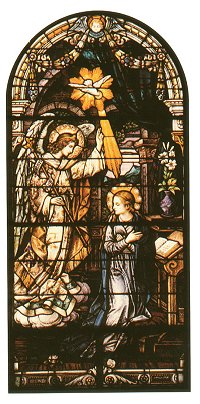 Annunciation - 1st Joyful Mystery |
 Visitation - 2nd Joyful
Mystery |
 Nativity - 3rd Joyful Mystery |
 Presentation - 4th Joyful
Mystery |
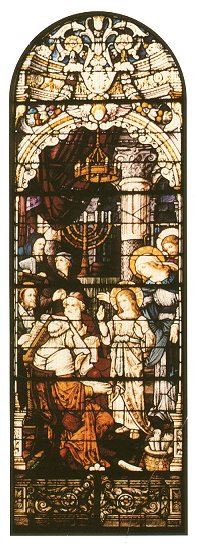 Finding of Jesus in the Temple- 5th
Joyful Mystery |
 Agony in the Garden 1st Sorrowful Mystery |
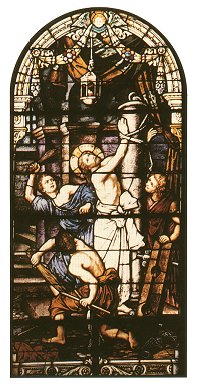 Scourging at the Pillar -
2nd Sorrowful Mystery |
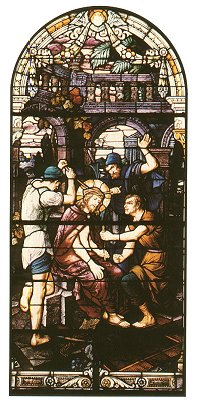 Crowning with Thorns - 3rd
Sorrowful Mystery |
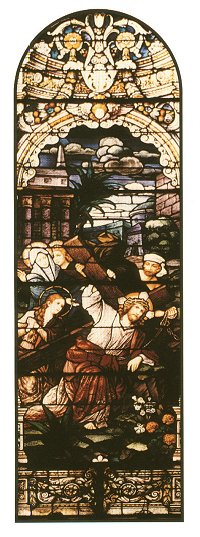 Carrying of the Cross - 4th
Sorrowful Mystery |
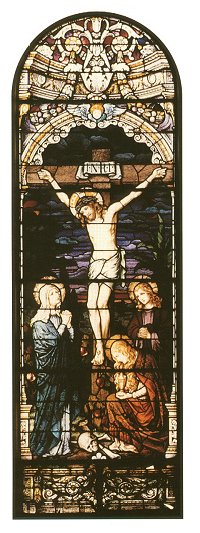 Crucifixion - 5th Sorrowful Mystery |
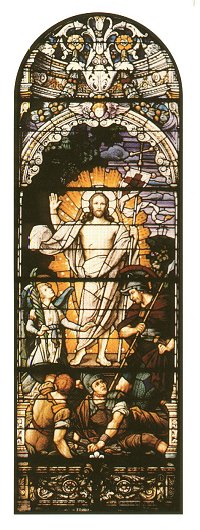 Ressurection - 1st Glorious
Mystery |
 Ascension - 2nd Glorious
Mystery |
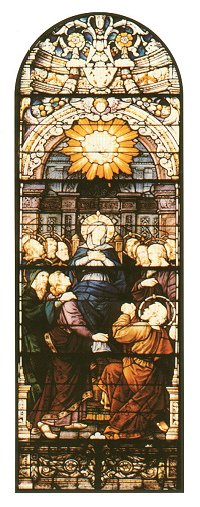 Descent of the Holy Spirit - 3rd
Glorious Mystery |
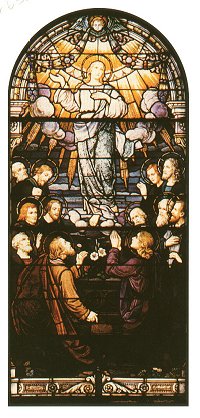 Assumption - 4th Glorious
Mystery |
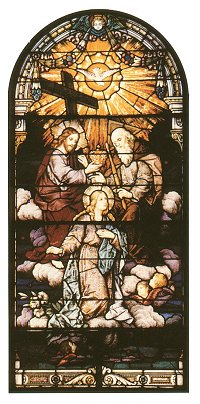 Coronation of Mary - 5th
Glorious Mystery |
Jesus speaks: And so here is My story. Do you like to play games?
You must follow the rules when you play games. The winner must follow the rules, or he has
to quit the game, or is penalized. The game I give you is life. It is played on a board
and the board has the 15 mysteries of the rosary. You live these mysteries in your lives.
The incarnation goes on in you, and you are meant to be formed more and more in My image.
I give you the gift of baptism, I elevate your human capabilities to share in the divine
activities of knowing and loving.
I am a good God. I speak to children. So many men have run away with
their intellectual whims and theories. They forget their hearts and the action of God
enlightening the soul to have deeper insights into the Divine Mysteries.
I use a fruit in the garden, a simple apple, but the rule of the one in
charge says, "do not eat of the forbidden fruit." I use a garden, simple things
for My children to understand. Elizabeth refers to the Son of God as a fruit, I am the
FIRST FRUITS of the garden. God gives you a free will. The rules of the game are you must
follow the Father's will.
1 Corinthians 15: 20-28
In fact, however, Christ has been raised from the dead,
as the first–fruits of all who have fallen asleep. As it was by one man that death
came, so through one man has come the resurrection of the dead. Just as all die in Adam,
so in Christ all will be brought to life; but all of them in their proper order: Christ
the first–fruits, and next, at his coming, those who belong to him. After that will
come the end, when he will hand over the kingdom to God the Father, having abolished every
principality, every ruling force and power. For he is to be king until he has made
his enemies his footstool, and the last of the enemies to be done away with is death, for he
has put all things under his feet. But when it is said everything is
subjected, this obviously cannot include the One who subjected everything to him. When
everything has been subjected to him, then the Son himself will be subjected to the One
who has subjected everything to him, so that God may be all in all.
Jesus speaks: Eve disobeys the Father's will. How many today on
the surface of the earth play as if no one is over them? They think they can find all the
answers in the world and inside themselves
The truth is given in My Word and the Commandments. I give you My
Church. The Church was instituted by Me. I made Peter the Rock. The individual is the
creature, he must live by the rules of the Creator.
I am the Son of God, the Son of Man, I come to show man how to be a son
of God. In the garden, I saw all the sin, I sweat My Blood for the willfulness.
It is easy to see, men try and try to do what Eve did over and over
again. They don't want to obey the Father. It is obedience God wants.
The plan of the Father is given clearly in the rosary that you must do
the Father's will, that is how I the Son of God lived.
Mary speaks: The Father sends the Son in the garden to show man
how to be a son of God. Jesus sweats Blood in the garden doing God's will.
When you look at the mysteries of the rosary, you see Jesus is beaten by
men when He is doing the Father's will. I did the will of the Father. Jesus did the will
of the Father.
Many try to make up their own rules, they tell themselves they can
follow their own rules and they do not have to obey God.
From meditating on the Sorrowful Mysteries, the message of Jesus in the
garden, Jesus at the pillar, Jesus crowned with thorns, Jesus carrying His cross, Jesus
crucified on the cross, tells you Jesus obeyed the Father's will. He was the new Adam in
the garden. The message of the Son of God, teaching men to be sons of God, is that He
obeyed the Father's will to His death on the cross.
The Son of God endured anything to please the Father. He was whipped,
beaten, crowned with thorns, made to carry the heavy cross and crucified doing the will of
God. Jesus' focus was doing God's will despite the cost.

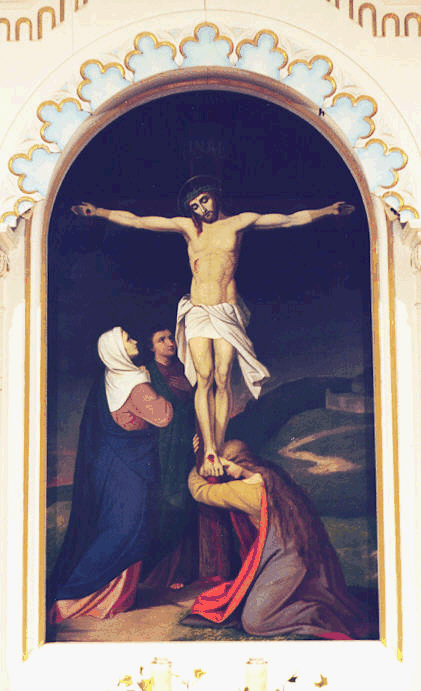
Mary speaks: Now I tell you, children, you have a free will and you play on the
surface of the earth and I watch you and I tell you, you must obey the Father's will.
A prayer for the children - my rosary.
Glory Be.
Our Father.
Hail Mary.
Study the words of the Our Father.
Say the Apostles Creed. Say the Hail Holy Queen and "Remember, most gracious
Virgin Mary----."
Blessed is the FRUIT of thy womb, Jesus.
Jesus is the first fruit.
HE IS MY FIRSTBORN.
YOU ARE MY CHILDREN.
THE INCARNATION GOES ON IN YOU.
THIS IS MY TEACHING IN THE ROSARY.
Jesus wore a crown of sharp thorns.
Will you wear a crown of victory, little olive leaves woven on your head?
Jesus carried the tree on His back.
The game of life continues.
The Father looks down.
He sees who play their own games.
He sees those who do their own will.
God is over all things.
How can you play the games of the Creator and leave Him out? Little, willful pieces
that play the game are headed for the pit, headed for destruction.
The tree was planted near the garden of the new tomb. The Son of God, Son of Man hung
on the tree of life. Jesus did His Father's will to His death. Jesus paid for your sins
with His precious Blood.
The rosary teaches you so many things, my children. You see a barren earth, and He
gives you barren women in the Bible who bear fruit. The barren Elizabeth brings forth John
in her old age, for nothing is impossible with God.
Near the place where Jesus was crucified was a new tomb in a garden. Jesus was put in
the earth there. Jesus came forth victorious. The sons of the earth must die to many
things.
Jesus gives you the Prayer for Union with Jesus
The following Imprimatur is for the Prayer for Union with Jesus and not
the message above or below.
 Prayer for Union with Jesus
Prayer for Union with Jesus
Come to me, Lord, and possess my soul. Come into my heart and permeate my soul. Help
me to sit in silence with You and let You work in my heart.
I am Yours to possess. I am Yours to use. I want to be selfless and only exist in
You. Help me to spoon out all that is me and be an empty vessel ready to be filled by You.
Help me to die to myself and live only for You. Use me as You will. Let me never draw my
attention back to myself. I only want to operate as You do, dwelling within me.
I am Yours, Lord. I want to have my life in You. I want to do the will of the
Father. Give me the strength to put aside the world and let You operate my very being.
Help me to act as You desire. Strengthen me against the distractions of the devil to take
me from Your work.
When I worry, I have taken my focus off of You and placed it on myself. Help me not
to give in to the promptings of others to change what in my heart You are making very
clear to me. I worship You, I adore You and I love You. Come and dwell in me now.
-God's Blue Book, January 17, 1994
Glorious Mysteries
Jesus, the New Adam, comes forth victorious from the tomb.
Jesus gives the Apostles power.
Jesus institutes the Church.
Jesus leaves the Apostles behind to carry out the work He began.
Jesus will work strongly on the earth through His Apostles in His Church.
Jesus gives the Apostles power to forgive sins.
They are given the authority to administer the sacraments. The priests are given authority
to baptize, forgive sins and change bread and wine into the Body and Blood of Jesus
Christ.
In the end things must be according to His will.
Do you want to follow Jesus or do you want to be on the top and do your own will?
The Son of God
rose victorious. |
Jesus ascends into heaven and leaves
behind the Apostles to carry out His work. |

|

|
Jesus acts in the Church.
Jesus sent the Holy Spirit.
Jesus left me to be with the Apostles.
The Holy Spirit gave the Apostles great grace to build up the Church.
The Holy Spirit works in the Church today.
I was taken up to heaven,
body and soul. |
I am crowned Queen of
Heaven and Earth. |

|

|
Revelation 11: 19
Then the sanctuary of God in heaven opened, and the ark of the covenant could be seen
inside it. Then came flashes of lightning, peals of thunder and an earthquake and violent
hail.
Revelation 12: 1-2
Now a great sign appeared in heaven: a woman, robed with the sun, standing on the moon,
and on her head a crown of twelve stars. She was pregnant, and in labour, crying aloud in
the pangs of childbirth.
Mary speaks: At a certain point willfulness will be stamped out, and
all that will remain will be the fruit of heaven.
Excerpt from October 7, 1999 daily message
Messenger: The day of the flood at Falmouth our Lord said, all that would remain
would be the fruit of heaven.
And so I quote from March 3, 1997:
March 3, 1997 Message
Day Falmouth Flooded Early Morning
Jesus speaks: Oh, the waters will run and the earth will shake and you will
suffer and suffer and work your own plan and say it happened before, it is not a sign from
God - it is a phenomenon, a happening, no reason to take notice.
And I will shake you on your tree and you will fall to the ground as rotten fruit and
all that will remain will be the fruit of heaven.
(End of Excerpt from October 7, 1999 daily message)
Messenger: Christ is the first fruit.
The children of the earth will realize they are Mary's children.
Mary speaks: I wish this message given July 5, 2000, in the front of
my Blue Rosary Book with the rainbow and rose.
Jesus speaks: The rosary tells you many things about Me and My Mother.
I see the willful ones trying to be in charge.
Mary calls out to them.
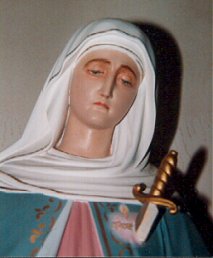

(End of Excerpt from July 5, 2000 Daily Message)
December 4, 2000 - Fourth Message
This is an outline from
Father Carter's class.
It is not complete - it is only an outline.
This is a continuation of the Theme of
Death - Resurrection
We are studying Christian life and how we live it.
Our object is to establish a comprehensive view of what is necessary for
the maintenance and development of full Christian living.
Response to God's Love is a book written by Fr. Carter and used as a text book
for about 16 years at Xavier University. He taught there for over 30 years. He has
authored some 17 books and written six years of priestly newsletters which have been
circulated around the world.
Jesus desires this section to be included. This book is so important to Jesus. You will
have greater insights into the Divine Mysteries if you read slowly as Jesus requests and
pray for vision and grace. Oh God, thank You for this great work.
The moment Fr. Carter took his pen in hand God was giving the world a great body of
knowledge to help renew the Church and the world.
Fr. Carter has spiritually directed all of us through his writings and Jesus has
directed him his whole life to help renew the Church and the world.
St. Claude de la Colombiere, St. Margaret Mary, St. Francis, St. Clare, St. Ignatius
and St. Xavier intercede for us, especially for the Jesuits to help us do this work to
help bring about the Reign of the Sacred Heart and triumph of Mary's Heart.
Messenger: In the study of Theme IV - Death-Resurrection it is
necessary to read the following material.
Response in Christ - Chapter 1
Response to God's Love - Chapter 4
Mother at Our Side - Chapter 9
Pain and the Joy - Chapters 2, 15, 26, 31, 32
Theme IV - Death and Resurrection
A. Concept of Death-Resurrection in
Salvation-History
B. The greatest tragedy of suffering is not that there is so much of it but so much of
it seems to be wasted.
C. Old Testament
D. Jesus
E. Church: Life of Death-Resurrection
F. Individual Christians
G. Some Particular forms of the Cross (Suffering)
Note: The reading of the material from Response in Christ will be very helpful
in understanding this material, therefore after the expanded outline Chapter 1 of Response
in Christ will follow.
Theme IV - Death and Resurrection
Expanded Outline
B. The greatest tragedy of suffering is not that there is so much of
it but so much of it seems to be wasted.
C. Old Testament
NOTE: Old Testament prefigures New Testament.
Exodus 24: 1-18 (From the Old Testament)
C:
THE RATIFICATION OF THE
COVENANT
He then said to Moses, ‘Come up to Yahweh, you and Aaron, Nadab
and Abihu, and seventy of the elders of Israel and bow down at a distance. Moses alone
will approach Yahweh; the others will not approach, nor will the people come up with
him.’
Moses went and told the people all Yahweh’s words and all the
laws, and all the people answered with one voice, ‘All the words Yahweh has spoken we
will carry out!’ Moses put all Yahweh’s words into writing, and early next
morning he built an altar at the foot of the mountain, with twelve standing–stones
for the twelve tribes of Israel. Then he sent certain young Israelites to offer burnt
offerings and sacrifice bullocks to Yahweh as communion sacrifices. Moses then took half
the blood and put it into basins, and the other half he sprinkled on the altar. Then,
taking the Book of the Covenant, he read it to the listening people, who then said,
‘We shall do everything that Yahweh has said; we shall obey.’ Moses then took
the blood and sprinkled it over the people, saying, ‘This is the blood of the
covenant which Yahweh has made with you, entailing all these stipulations.’
Moses, Aaron, Nadab, Abihu and seventy elders of Israel then went up,
and they saw the God of Israel beneath whose feet there was what looked like a sapphire
pavement pure as the heavens themselves, but he did no harm to the Israelite notables;
they actually gazed on God and then ate and drank.
Moses on the mountain
Yahweh said to Moses, ‘Come up to me on the mountain. Stay there,
and I will give you the stone tablets—the law and the commandment—which I have
written for their instruction.’ Moses made ready, with Joshua his assistant, and they
went up the mountain of God. He said to the elders, ‘Wait here for us until we come
back to you. You have Aaron and Hur with you; if anyone has any matter to settle, let him
go to them.’ Moses then went up the mountain.
Cloud covered the mountain. The glory of Yahweh rested on Mount Sinai
and the cloud covered it for six days. On the seventh day Yahweh called to Moses from
inside the cloud. To the watching Israelites, the glory of Yahweh looked like a devouring
fire on the mountain top. Moses went right into the cloud and went on up the mountain.
Moses stayed on the mountain for forty days and forty nights.
The Old Testament prepares the way for new covenant established by Jesus.
For years the Israelites lived under Egyptian enslavement.
They escaped by the parting of the Red Sea.
This parting of the Red Sea prefigures Baptism.
The Israelites under Moses went down into the parted waters and they came up.
Our founder considered the following Scripture passages with regard to
these subjects.
Romans 6: 1-11 (From the New Testament)
Baptism
What should we say then? Should we remain in sin so that grace may be
given the more fully? Out of the question! We have died to sin; how could we go on living
in it? You cannot have forgotten that all of us, when we were baptised into Christ Jesus,
were baptised into his death. So by our baptism into his death we were buried with him, so
that as Christ was raised from the dead by the Father’s glorious power, we too should
begin living a new life. If we have been joined to him by dying a death like his, so we
shall be by a resurrection like his; realising that our former self was crucified with
him, so that the self which belonged to sin should be destroyed and we should be freed
from the slavery of sin. Someone who has died, of course, no longer has to answer for sin.
But we believe that, if we died with Christ, then we shall live with
him too. We know that Christ has been raised from the dead and will never die again. Death
has no power over him any more. For by dying, he is dead to sin once and for all, and now
the life that he lives is life with God. In the same way, you must see yourselves as being
dead to sin but alive for God in Christ Jesus.
Luke 24: 13-27 (From the New Testament)
The road to Emmaus
Now that very same day, two of them were on their way to a village
called Emmaus, seven miles from Jerusalem, and they were talking together about all that
had happened. And it happened that as they were talking together and discussing it, Jesus
himself came up and walked by their side; but their eyes were prevented from recognising
him. He said to them, ‘What are all these things that you are discussing as you walk
along?’ They stopped, their faces downcast.
Then one of them, called Cleopas, answered him, ‘You must be the
only person staying in Jerusalem who does not know the things that have been happening
there these last few days.’ He asked, ‘What things?’ They answered,
‘All about Jesus of Nazareth, who showed himself a prophet powerful in action and
speech before God and the whole people; and how our chief priests and our leaders handed
him over to be sentenced to death, and had him crucified. Our own hope had been that he
would be the one to set Israel free. And this is not all: two whole days have now gone by
since it all happened; and some women from our group have astounded us: they went to the
tomb in the early morning, and when they could not find the body, they came back to tell
us they had seen a vision of angels who declared he was alive. Some of our friends went to
the tomb and found everything exactly as the women had reported, but of him they saw
nothing.’
Then he said to them, ‘You foolish men! So slow to believe all
that the prophets have said! Was it not necessary that the Christ should suffer before
entering into his glory?’ Then, starting with Moses and going through all the
prophets, he explained to them the passages throughout the scriptures that were about
himself.
Exodus 12: 1-26 (From the Old Testament)
E: THE
PASSOVER
Yahweh said to Moses and Aaron in Egypt, ‘This month must be the
first of all the months for you, the first month of your year. Speak to the whole
community of Israel and say, "On the tenth day of this month each man must take an
animal from the flock for his family: one animal for each household. If the household is
too small for the animal, he must join with his neighbour nearest to his house, depending
on the number of persons. When you choose the animal, you will take into account what each
can eat. It must be an animal without blemish, a male one year old; you may choose it
either from the sheep or from the goats. You must keep it till the fourteenth day of the
month when the whole assembly of the community of Israel will slaughter it at twilight.
Some of the blood must then be taken and put on both door–posts and the lintel of the
houses where it is eaten. That night, the flesh must be eaten, roasted over the fire; it
must be eaten with unleavened bread and bitter herbs. Do not eat any of it raw or boiled
in water, but roasted over the fire, with the head, feet and entrails. You must not leave
any of it over till the morning: whatever is left till morning you must burn. This is how
you must eat it: with a belt round your waist, your sandals on your feet and your staff in
your hand. You must eat it hurriedly: it is a Passover in Yahweh’s honour. That
night, I shall go through Egypt and strike down all the first–born in Egypt, man and
beast alike, and shall execute justice on all the gods of Egypt, I, Yahweh! The blood will
be a sign for you on the houses where you are. When I see the blood I shall pass over you,
and you will escape the destructive plague when I strike Egypt. This day must be
commemorated by you, and you must keep it as a feast in Yahweh’s honour. You must
keep it as a feast–day for all generations; this is a decree for all time.
The feast of Unleavened Bread
"For seven days you must eat unleavened bread. On the first day
you must clean the leaven out of your houses, for anyone who eats leavened bread from the
first to the seventh day must be outlawed from Israel. On the first day you must hold a
sacred assembly, and on the seventh day a sacred assembly. On those days no work may be
done; you will prepare only what each requires to eat. You must keep the feast of
Unleavened Bread because it was on that same day that I brought your armies out of Egypt.
You will keep that day, generation after generation; this is a decree for all time. In the
first month, from the evening of the fourteenth day until the evening of the
twenty–first day, you must eat unleavened bread. For seven days there may be no
leaven in your houses, since anyone, either stranger or citizen of the country, who eats
leavened bread will be outlawed from the community of Israel. You will eat nothing with
leaven in it; wherever you live, you will eat unleavened bread." ’
Injunctions relating to the Passover
Moses summoned all the elders of Israel and said to them, ‘Go and
choose a lamb or kid for your families, and kill the Passover victim. Then take a bunch of
hyssop, dip it in the blood that is in the basin, and with the blood from the basin touch
the lintel and both door–posts; then let none of you venture out of the house till
morning. Then, when Yahweh goes through Egypt to strike it, and sees the blood on the
lintel and on both door–posts, he will pass over the door and not allow the Destroyer
to enter your homes and strike. You will observe this as a decree binding you and your
children for all time, and when you have entered the country which Yahweh will give you,
as he has promised, you will observe this ritual. And when your children ask you,
"What does this ritual mean?" you will tell them, "It is the Passover
sacrifice in honour of Yahweh who passed over the houses of the Israelites in Egypt, and
struck Egypt but spared our houses." ’ And the people bowed in worship. The
Israelites then went away and did as Yahweh had ordered Moses and Aaron.
The tenth plague: death of the first–born
And at midnight Yahweh struck down all the first–born in Egypt
from the first–born of Pharaoh, heir to his throne, to the first–born of the
prisoner in the dungeon, and the first–born of all the livestock. Pharaoh and all his
officials and all the Egyptians got up in the night, and there was great wailing in Egypt,
for there was not a house without its dead. It was still dark when Pharaoh summoned Moses
and Aaron and said, ‘Up, leave my subjects, you and the Israelites! Go and worship
Yahweh as you have asked! And take your flocks and herds as you have asked, and go! And
bless me too!’ The Egyptians urged the people on and hurried them out of the country
because, they said, ‘Otherwise we shall all be dead.’ So the people carried off
their dough still unleavened, their bowls wrapped in their cloaks, on their shoulders.
The Egyptians plundered
The Israelites did as Moses had told them and asked the Egyptians for
silver and golden jewellery, and clothing. Yahweh made the Egyptians so much impressed
with the people that they gave them what they asked. So they despoiled the Egyptians.
Excerpts from Response In Christ, by Father Edward J. Carter, S.J.
... Here the covenant between Yahweh and His People was sealed with
sacrificial blood. ...
... Moses sprinkled with blood both the altar, representing Yahweh, and
the Jewish people. ...
... Since blood signified life for the Jews, such an action had deep
meaning for them. It symbolized the sealing of the covenant, the establishment of a new
life-relationship between Yahweh and themselves.
(End of Excerpts from Response In Christ)
D. Jesus
E. Church: Life of Death-Resurrection
F. Individual Christians
Romans 6: 1-11
Baptism
What should we say then? Should we remain in sin so that grace may be
given the more fully? Out of the question! We have died to sin; how could we go on living
in it? You cannot have forgotten that all of us, when we were baptised into Christ Jesus,
were baptised into his death. So by our baptism into his death we were buried with him, so
that as Christ was raised from the dead by the Father’s glorious power, we too should
begin living a new life. If we have been joined to him by dying a death like his, so we
shall be by a resurrection like his; realising that our former self was crucified with
him, so that the self which belonged to sin should be destroyed and we should be freed
from the slavery of sin. Someone who has died, of course, no longer has to answer for sin.
But we believe that, if we died with Christ, then we shall live with
him too. We know that Christ has been raised from the dead and will never die again. Death
has no power over him any more. For by dying, he is dead to sin once and for all, and now
the life that he lives is life with God. In the same way, you must see yourselves as being
dead to sin but alive for God in Christ Jesus.
2 Corinthians 4: 7-11
The hardships and hopes of the apostolate
But we hold this treasure in pots of earthenware, so that the immensity
of the power is God’s and not our own. We are subjected to every kind of hardship,
but never distressed; we see no way out but we never despair; we are pursued but never cut
off; knocked down, but still have some life in us; always we carry with us in our body the
death of Jesus so that the life of Jesus, too, may be visible in our body. Indeed, while
we are still alive, we are continually being handed over to death, for the sake of Jesus,
so that the life of Jesus, too, may be visible in our mortal flesh.
G. Some Particular forms of the Cross (Suffering)
Self-Discipline
Renunciation
Everydayness
Crucial decision making - (am I doing the right thing)
Failure
Transitions in life (hardships)
Uncertainty
Other (Physical and Mental sicknesses)
Loneliness
Rejection
Escapism
Shattered Dreams
Definition Escapism is unhealthy or immature flight from painful
reality.
Excerpt from Response in Christ, by Father Edward J. Carter, S.J.
ONE The Concept of
the Christian Life
There are various points of departure for a treatment of the Christian
life. Our particular choice consists in giving a general, panoramic view of this life in
this chapter with a consequent deepening of ideas in the pages to follow. Inevitably the
themes put forth here will receive only a sketchy treatment, and to this extent the
chapter will not give complete satisfaction. However, such a procedure allows for an
immediate view of our complete life of grace in Christ. This preliminary glimpse can
consequently serve throughout as a constant, unifying frame of reference.
The Christian life essentially consists in God's
loving self-communication to us with our concomitant response to Him in love. One peculiar
characteristic of this communication of God to man is that it has centered itself within a
concrete historical framework. God's gift of Himself therefore establishes the process of
salvation history. This process began with man's creation and elevation to the
supernatural life, a life which is a participation in God's own divine life. This
participation is real and, therefore, somewhat similar to life as it is in God Himself;
however, since it is only a created sharing, man possesses it in an infinitely less
perfect manner than God who is Himself this life.
Man rejected this self-communication of God in
original sin. Yet God's desire to give Himself to man was not withdrawn. He determined to
save man from his sinfulness, and thereafter the divine communication centered around the
promised Redeemer. Salvation history preceding the advent of this Redeemer became a
preparation for the Redeemer's coming. From the time of His coming, salvation history was
and is the establishment and continuation of His redemptive work.
1. The Christian
Life as Prefigured in the Mosaic Covenant
In the age prior to the coming of Christ, salvation history was rooted
in the Mosaic period. At the heart of this Mosaic era was the great salvific event of the
exodus (Ex 15:1-18). Through this event Yahweh led the Israelites out of Egyptian slavery
and under Moses formed them into His People. The history of the Jewish people previous to
this exodus event was merely a preparation for this central happening. Thus Israel in
recalling its ancient traditions could see that Yahweh's covenant with Abraham, Isaac and
Jacob was a preparation for the great covenant definitively established through Moses on
Mount Sinai.
God, then, within the framework of salvation history
has determined to communicate Himself according to a covenant. What is covenant? In
reference to salvation history it is a mutual life relationship in love between God and
His People, and among the People themselves. God on His part communicates His own life
through grace, and man in return gives himself to God and his fellowman in loving service.
There are various laws governing the multiple aspects of this life-relationship. There is
a formal worship with its determined ritual. Yet everything centers around the essence of
covenant, the life relationship.
As mentioned, the Mosaic covenant dominated the Old
Testament period. At the heart of the formation of this covenant there was a transition
process involved as the Jews were led forth from Egyptian slavery to freedom under the
leadership of Moses. The Egyptians had finally consented to this departure of the Jews
under the pressure of the last of the plagues inflicted upon them. Under this plague the
Egyptians' first-born were slain. The Jews escaped this deathblow of Yahweh by marking
their doorposts with the blood of the paschal lamb: ". . . I will go through the land
of Egypt and strike down all the first-born in the land of Egypt, man and beast alike, and
I shall deal out punishment to all the gods of Egypt, I am Yahweh! The blood shall serve
to mark the houses that you live in. When I see the blood I will pass over you and you
shall escape the destroying plague when I strike the land of Egypt." (Ex 12:12-13).
As the Jewish people escaped from Egyptian bondage
they experienced a transition which was essentially religious in nature. This transition
was from a less perfect to a more perfect type of existence, for in being released from
slavery they were gradually formed into Yahweh's People. The definitive event of this
formation occurred on Mount Sinai. Here the covenant between Yahweh and His People was
sealed with sacrificial blood. Moses sprinkled with blood both the altar, representing
Yahweh, and the Jewish people. Since blood signified life for the Jews, such an action had
deep meaning for them. It symbolized the sealing of the covenant, the establishment of a
new life-relationship between Yahweh and themselves.
2. Life in the
New Covenant
This Mosaic covenant prefigured the covenant which was to be
established in Christ. Yahweh had given himself to the Jews in a special way. He was their
God and they were His People. This life relationship was highly imperfect, however, if
compared to that instituted by Christ. The covenant life between God and man established
by the Incarnate Word is of the most intimate nature. We see this if we consider the new
covenant as being contained in a perfect way in Christ Himself. He is radically the new
covenant.1 Covenant, remember, has various dimensions of love. Out of love God
shares His life with man, and man in community responds in love by giving himself to God
and relating in love with his neighbor. In Christ we perceive these relationships achieved
in the most perfect manner possible. First of all, Christ in His humanity receives the
divinity's gift of self in the highest degree – to such a high degree, in fact, that
we have the hypostatic union as a result. In other words, the human nature of Christ is
recipient of God's self-communication in such a perfect manner that it does not exist by
reason of its own personal act of existence, but rather by the divine existence of the
Word, the second person of the Trinity.
Christ as man – in the name of all men, for all
men – perfectly receives God's communication of Himself in grace. This is the first
movement of covenant life, downward from God to man. In the second movement of covenant,
man's response, we again see Christ as central. As man, Christ makes the perfect response
to God for all men. This response of Christ includes both His love for His Father and His
relationship in love with men. His entire life was itself this perfect response. His life,
submerged in a constant, loving conformity to His Father's will, was and is the perfect
incarnate response which man is called upon to make to his covenant God.
The response which Christ made was centered in His
death and Resurrection. These two events contained the whole of Christ's life and are
intimately united. Everything which Christ did previous to Calvary was a preparation for
Calvary and consequently shared its redemptive value. The Resurrection was in one way or
another the completion of the work of Calvary. Since Christ's perfect response to the
Father culminated in His death-resurrection, it is evident that Christ's life involved a
transition just as did the life of the Jewish people in the old covenant. This transition
of the Israelites was manifested in the exodus from Egypt. In fact, Christ's transition in
death-resurrection was a fulfillment of the Jewish exodus; and just as the transition of
the Jews marked a passage from a lower to a higher type of existence, so did Christ's
transition or passover have this characteristic.
What was Christ's transition? Before Christ
experienced death, He was limited by the sinfulness of the world into which He had
immersed Himself in His Incarnation. He loved men, and He loved to be in their midst, and
in the midst of their world. But He did suffer from the sinfulness of this world. Sinless
though He Himself was, He was in certain ways affected and limited by sin. Indeed, sin
destroyed Christ in his mortal existence. This shows us the degree to which Christ was
limited by or "hemmed in" by the world's sinfulness. But through the passageway
of His death, Christ passed beyond the limitations He had experienced in His mortal life.
He conquered sin, and He rose into a more perfect type of life, that of the Resurrection.
In such a life He could no longer suffer, He could no longer be "limited" by the
sinful aspect of the world.
There is another similarity between the Jewish
transition or exodus and the transition involved in Christ's death-resurrection. We saw
the part that sacrificial blood contributed to the passover or transition of the Jewish
people in two instances. The blood of the paschal lamb freed the Jewish homes from the
deathblow of Yahweh immediately before their departure from Egypt, and ultimately it was
sacrificial blood which sealed the Mosaic covenant upon Mount Sinai.
Sacrificial blood was also essential in Christ's
passover or transition. It was through the shedding of His blood that He passed through
death to Resurrection. It was thus His blood which made the transition possible and which
sealed the new covenant. This new covenant, supplanting the old, is the new life
relationship between God and His People, and the People themselves. Christ, in achieving
new life through death-resurrection, gained it not only for Himself but for all His
members.
The Christian, then, shares in the life of Christ's
Resurrection. But if he participates in the Resurrection of Christ he must also share in
Christ's death, since death is the way to Resurrection. St. Paul tells us: "We are
dead to sin, so how can we continue to live in it? You have been taught that when we were
baptised in Christ Jesus we were baptised in his death; in other words, when we were
baptised we went into the tomb with him and joined him in death, so that as Christ was
raised from the dead by the Father's glory, we too might live a new life." (Rm
6:2-4).
Through Baptism therefore the Christian is
incorporated into Christ's death-resurrection. Baptism pledges the Christian to die to sin
and ideally to all that is not in accordance with God's will, even though sin is not
involved. Baptism also pledges the Christian to live vitally his new life in Christ, his
share in Christ's Resurrection. As he is incorporated into Christ through baptism, the
Christian is also made a member of the Church. Awareness of this simultaneous
incorporation into both Christ and the Church emphasizes for the Christian the fact that
his life of holiness in Christ is to be lived out in community. In other words, the
Christian lives in Christ within the People of God, within the Church. This stress of
contemporary spirituality upon the communal aspect of Christian holiness is firmly rooted
in God's revealed truth. Throughout salvation history God has lovingly communicated
Himself to man within the covenant framework with its communal dimension. He has also
asked for man's response in love within this same covenant framework.
The Church in union with Christ is the new covenant.
Since Christ is the Head of His Church, it follows that the Church with her members must
live out the covenant life according to the structure which Christ gives her. The Church
has no life, no pattern of life, except that which Christ gives her. This basic pattern or
structure is death-resurrection. Christ established the Church by His paschal mystery, His
death-resurrection. In so establishing the Church by such an event, Christ also determined
how the Church essentially lives out her covenant life down through the ages –
through death and Resurrection.
The Church, then, continues Christ's
death-resurrection. She consequently continues the entire mystery of Christ, since
Christ's entire life is contained in His passover event.2 We see therefore why
the Church can be referred to as the continuation of the redemptive Incarnation. Indeed
the Church is Christ, the mystical Christ. Because she is the earthly continuation of
Christ, the Church has everything within her structure needed to be the source of
salvation and sanctification for men of all times. For instance, in reference to the
presently much-discussed theme of the Church's relevancy to modern man, we know from
theological reflection that the Church has this relevancy radically structured within her
very existence. This is simply an application of the reality that the Church actually does
prolong the mission of the Incarnate Word; since Christ was relevant to His age, the
Church has the capacity to be relevant to all ages.
What do we mean by saying Christ was relevant to His
age? Christ revealed the Father and communicated the Father's life to men by adapting
Himself in a fundamental way to the life situation which existed at that particular time
in Jewish history. Since Christ through His humanity adapted His message to the people of
His times, so the Church must use her innate capacity to be relevant for the men of this
or that age. She must in a sense be constantly reincarnating Christ, for she is the only
visible Christ which this world now has. This reincarnation largely means being relevant.
As the Church is the continuation of Christ, so is
the life of the Christian. Just as the Church centers her life in Christ's
death-resurrection, so does the life of the Christian. Both Church and Christian then are
continually dying with Christ, dying to all which is not of Christ. At the same time
Church and Christian are meant to rise more and more with Christ, assimilating ever more
perfectly His life through grace. This life of grace is the Church's and the Christian's
share in Christ's Resurrection. It is true that this life of grace will have its
completion only in eternity. Nevertheless, it does have very real beginnings here in this
life.
It is therefore apparent why the Church's life is
directed to the liturgy, especially the eucharistic liturgy.3 For it is within
the liturgy culminating in the Mass that the death-resurrection of Christ is constantly
renewed in a special manner. In the Mass the People of God have the constant opportunity
to assimilate the death-resurrection of Christ more and more into their lives. As they do
so collectively and individually, the People of God are continuing Christ's life and
mission upon earth.
The Christian life, then, is a response to God's
gift of Himself. God in love gives us a life of grace, a share in His own divine life. We
respond in love by giving ourselves to God and our fellowman, by dynamically living out
this life of grace, this Christ-life, in the pattern of death-resurrection. This life of
grace is meant to be exercised constantly, as the Christian loves God and man, in Christ,
according to the will of the Father. Also, to reiterate, God intends that our life in
Christ be lived out in the community of the Church. The Christian life can never solely be
an individual's response to his God.
As the Christian lives out this life of grace in
community, he is offering Christ a new humanity through which He can reincarnate Himself.
It is not only through the Church as a whole that Christ reincarnates Himself, but also,
ideally, through each Christian within the Church. Each Christian has a special
responsibility and privilege. No one else can offer Christ the unique opportunity of
reincarnating Himself as can this or that particular Christian. For each Christian is a
unique, created imitation of God never again to be repeated. Each Christian has a unique
humanity to offer Christ. To the extent that he fails to do so, to that degree Christ has
lost this opportunity to reincarnate Himself through this humanity.
Consequently, the Christian life can be conceived as
the Christian permitting Christ to live more and more through his total person. Christian
holiness is continual growth in the assimilation of that great thought of St. Paul,
". . . I live now not with my own life but with the life of Christ who lives in
me." (Ga 2:20).
There are many ways in which the Christian can
permit Christ to live in and through him. Love of the Father and love of all men, of
course, are the two great themes which will channel this reincarnation of Christ. These
were the great driving forces in Christ's life, and consequently they will be so in the
life of the Christian.
If the Christian is to grow in projecting Christ
through his Christian personality, he must be aware of the many various ways in which
Christ loved His Father, and His will. He must be aware of the various ways in which the
Father's will comes to him, and thus he will realize the multiple ways in which he is to
love the Father in embracing that will. The Father's will can come to him in joy and
happiness or in pain and sorrow; in work or in relaxation; in a life of great obscurity as
well as in a life which commands public attention; in frustration or in success. These and
many other channels of the Father's will offer the Christian the opportunity to continue
this witness of Christ's life: no matter how easy or difficult, the Father's will must be
lovingly embraced in all things. This is how Christ radically saved the world. This is how
the Church, living according to the same principle, cooperates with Christ in furthering
His redemptive work.
Christ's great love and concern for men must also be
continually reincarnated through the Christian. Contemporary spirituality makes
considerable use of personalism.4 One basic way we can apply personalism to our
present theme is as follows: God revealed His love to men in a concrete way, through a
Person possessing a tangible, visible human nature. Although this tangible, historical
Christ is no longer with us upon earth, the basic plan of the Father continues. To a
considerable degree He still continues to give Himself, His love, through tangible,
visible human natures. It is through the Christian united with Christ that God continues
in many ways to make His love tangible, visible – and human – to mankind.
Through these brief indications we can realize the
various and many possibilities through which Christ lives again in the Christian. As the
Christian in this manner projects Christ to his contemporary world he relives the total
mystery of Christ. All the mysteries of Christ's life will be apparent somehow in such a
Christian existence. But as the Christian puts on Christ more and more, death-resurrection
will be especially apparent. For the Christian will be more and more going out of a
self-centered existence, dying to that which is not really life at all, and increasingly
passing over into a greater existence, into the life of Christ Himself. In this manner the
Christian continues that transition process of passing from a lower to a higher mode of
existence. We have seen this transition process to be at the heart of salvation history.
We saw it in the exodus-event of the Jewish people. We saw it in the death-resurrection of
Christ. We continue to find it in the life of the Christian as he prolongs the paschal
mystery of Christ.
Yes, we live a new life in Christ. Christ,
therefore, wants to share everything relating to our existence – sin alone excepted.
When He united us to Himself in assuming human nature, He united to Himself all our
authentic concerns, values and interest. He is truly a man, and He wants to share with us
all our truly human experiences. He and His grace want to touch these experiences. Nothing
which is really human is alien to our life in Christ.
We enjoy the freshness of a bright clear day, the
stillness of the night, the innocence of a little child, the companionship of a friend,
the relaxation or stimulation of a good movie. Christ wants to share these joys with us.
In our daily work there is a sense of satisfaction, accomplishment and joy – there
also can be pain, disappointment and misunderstanding. Christ wants to be there in the
midst of all.
A strong, young American, the pride of his father,
and full of promise, goes off to war. One day he fights his last and is no more. His
father is in anguish and sorrow, and we sympathize. We observe the hatred and suspicion
which exists between many white men and many black men, and our hearts grieve. Science
achieves a great new discovery, and we are glad for this progress of the human race. A
young man and woman are deeply in love, they marry, and their joy is great. And we rejoice
with them. All these human experiences Christ wants to share with us, for He, too, is a
man. The Christian actually is in Christ, and we must be bold enough to apply this reality
to all the authentic areas of our existence. Christ wants it no other way.
The chief source of strength for the Christian as he
lives in Christ is the liturgy, for this is the heart of the Church's life. Yet
participation in the liturgy alone will not make certain the Christian's progress in
holiness.5 The Christian must be constantly living out his previous
participation. His life in Christ necessitates various types of activity which complement
his liturgical life.
One such form of Christian endeavor is Christian
asceticism. Karl Rahner says that our present age is very much in need of a sound
asceticism.6 There are various reasons for asceticism in any age.
Because of original and personal sin, the Christian has within himself many tendencies
which are not in accord with Christ. Whether these involve the exterior senses or the
interior senses and spiritual faculties, these tendencies must be controlled; otherwise,
the Christ-life, the life of grace, cannot dominate the total person of the Christian as
it is meant to do. Christian asceticism therefore embraces the traditional concept of
mortification, namely a constant, reasonable control of the total person. Asceticism also
includes the idea of organized effort in the spiritual life; it includes moreover the idea
of renunciation and penance. These are traditional meanings of the term.
Yet Christian asceticism as contemporary thought
conceives it goes further than mere control, organized effort, renunciation and penance.
It embraces the reality of selflessness, a gradual going out from self-centeredness. As
the Christian grows, his existential frame of reference becomes more and more Christ and
others. To live means increasingly to love Christ and men. Paradoxically, the more the
Christian goes out of himself, the more he authentically becomes himself, the more he
becomes a true person. Viewed in terms of death-resurrection, Christian asceticism is seen
to be more concerned with the death aspect of the paschal mystery. However, Resurrection
is also present in a proper asceticism, for, among other reasons, Christian asceticism
carries with it its own joy – a share in Resurrection joy.
Asceticism and other expressions of the Christian
life involve the exercise of the infused virtues, both theological and moral. These
virtues can be conceived of in terms of supernatural faculties which give expression to
our life of grace in Christ. These virtues, the chief of which are faith, hope and love,
give the Christian all the capacities he needs to form meaningful, graced relationships
with God, man and the rest of creation. (The horizontal dimension outward to man and
creation is receiving special attention in the contemporary treatment of faith, hope and
love.) Although the death aspect of the paschal mystery is present in the exercise of the
virtues, we more easily identify these virtues with the Resurrection aspect of the paschal
mystery. For the life of grace, with the infused virtues playing a dominant role, is our
share in Christ's Resurrection.
The life of the Christian must also involve prayer.
Why? Our life of grace is a created participation in Trinitarian life. What is life in
God? It is essentially a life of knowledge and love. The life of the Trinity consists in
the knowledge and love which exists between Father, Son and Holy Spirit. Then it is from
the Trinity that the knowledge and love of God also goes out to creation.
Our life of grace is structured in the same manner.
In union with Christ it essentially consists in knowing and loving God and in knowing and
loving His creation, both on a supernatural level. Because this life of grace is centered
in God, prayer is an absolute necessity. For prayer essentially is an interpersonal
dialogue between God and the Christian. Without prayer the knowing and loving of God will
never be what it should and neither will be the knowledge and love of God's creation. For
one cannot envision, one cannot love man and the rest of creation without the intimate
contact with God which prayer gives. This is because it is God's vision and God's
love of His creation which the Christian shares in the life of grace.
The Christian, however, must not only pray. He must
also externalize his life of knowledge and love in various ways. Today's spirituality with
its incarnational trend stresses this fact.7 The Christian's life of
Resurrection in Christ must to a considerable extent express itself in the daily world
which surrounds him. This Christ-life must be expressed in the Christian's concern for the
problems of the inner city and in his concern for a more just distribution of the world's
wealth. It must manifest itself in the Christian's solicitude for the diseased and the
poverty-stricken the world over. This life we have in Christ must incarnate itself in a
concern over the spread of pornographic literature and other forms of godlessness. It must
manifest itself as solicitous regarding the hatred which often exists between black man
and white man. Our Christ-life must also express itself by our showing a tangible, warm
love and interest toward those with whom we come into direct encounter.
This list of love and concern on the part of the
Christian could be extended on and on. To what extent the Christian will manifest his
concern in any of these areas will depend upon his vocation, the graces he receives and
other circumstances. Our main point is this: the Christian through his life of grace in
Christ has been called to further the creative and redemptive effort of God. He must,
therefore, intimately involve himself in the affairs of this world. (Even the cloistered
contemplative is called to involvement through such means as prayer.)
We have briefly indicated that the life of the
Christian involves liturgy, asceticism, the exercise of the infused virtues, prayer and
action. Rounding out such a list are other traditional aids to holiness, for example,
spiritual reading, examination of conscience, spiritual direction. All of these are means
of expressing our life of grace in Christ. They are also ways of growing in that life. All
these should be seen in their connection with the Christian's participation in the
passover mystery of Christ, His death-resurrection.
This first chapter has purposely centered the
reality of the Christian life around the death-resurrection of Christ. In the remaining
chapters we will expand upon the essentials we have treated briefly in these first pages.
As we progress, we hope to show in detail that Christian holiness is life in Christ, for
our life in Christ contains everything – our love of God, our love of men, our love
of all creation. We hope to portray the Christian as one who believes from the depths of
his being that to live is Christ.
_______
1. Cf. Bernard Cooke,
"Synoptic Presentation of the Eucharist as Covenant Sacrifice" in Theological
Studies, Vol. 21, (1960), p. 36.
2. The Mystery of Christ is essentially
one reality. Any of the individual mysteries implicitly contains the others. For a
treatment of this, cf. L. Bouyer, Liturgical Piety (Notre Dame, Indiana: Notre Dame
University Press, 1955), pp. 189-190.
3. Cf. Second Vatican Council, The
Constitution on the Sacred Liturgy, No. 10.
4. Cf., for example, E. McMahon and P.
Campbell, Becoming a Person in the Whole Christ (New York: Sheed & Ward, 1967).
5. Cf. Second Vatican Council, The
Constitution on the Sacred Liturgy, No. 12.
6. Cf. Karl Rahner, Spiritual
Exercises (New York: Herder & Herder, 1965) pp. 66-79.
7. Cf., for example, Second Vatican
Council, Constitution on the Church in the Modern World, No. 34.
(End of Excerpt from Response in Christ)
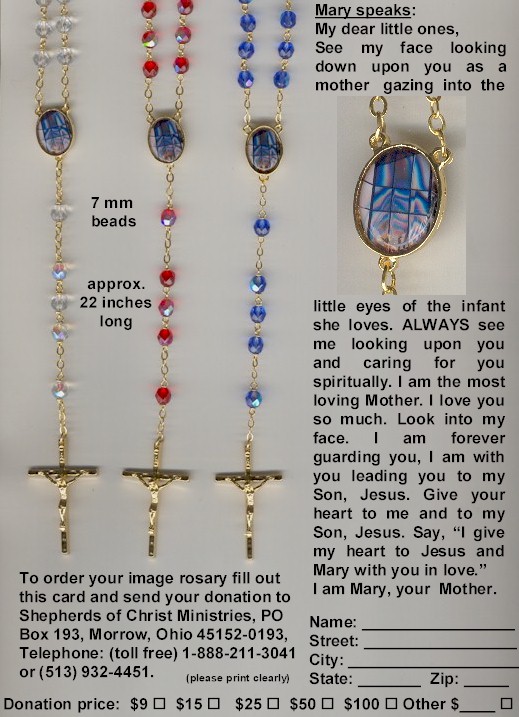
(Please copy and pass out to family and friends.)
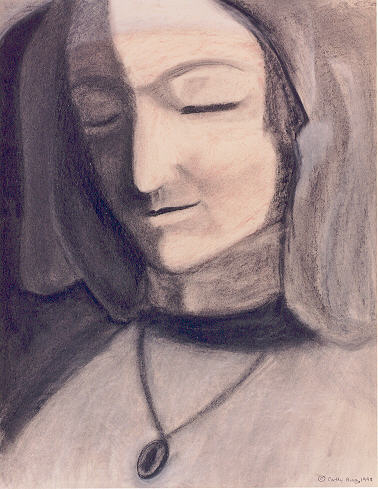 Mary's
Message from the Rosary of August 27, 1996
Mary's
Message from the Rosary of August 27, 1996
Mary speaks: I stood beneath the cross
of my Son, and my Heart was in such pain for I saw Him before my eyes. I saw Him covered
with blood. I saw Him die. My Heart, my children, my Heart to watch my Son, but my Heart,
my Heart, how I suffered for my little children of the world that give in to this world
and give up the love of my Son. O my little children of light, I give you this message.
Carry this light into the darkness for your Mother Mary, for I stood beneath the cross and
I cried. I cried for the little ones. I cried for the young ones, the ones that do not
care and will lose their souls. How do I make you see for you will not listen to me? What
can I do? I come. I appear. I beg. I plead. I give you these gifts from my Son, and you
reject me. I do not deliver messages very often anymore for I have been ignored. The
message is the same. You do not read the messages I have given to you. Please help me.
Help the little children. I appear. I appear. I appear, and I am ignored. I stood beneath
the cross, and I cried. I cried, and my Heart was in such anguish for my little children,
for I am searching for them this day as I searched for the Child Jesus. Please, please
help me. I cannot hold back the hand of my Son any longer. I am Mary, your Mother. I ask
you to help my children. You are my children of light.
Song: O Lady of Light, shining so bright,
be with us this day, guiding our way, O Lady, O Lady of Light.
Mary speaks: I appear to you as
Our Mother of Sorrows.
(End of Mary's Message)
MY
VALENTINE FOR JESUS AND MARY
AND THE WORLD
I _________________ give my
heart to
You Jesus and Mary on this day
_________________
I promise to help spread the devotion to
the Hearts of Jesus and Mary.
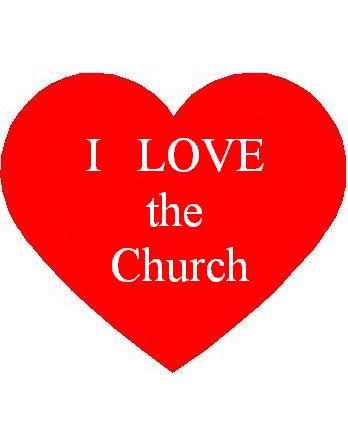 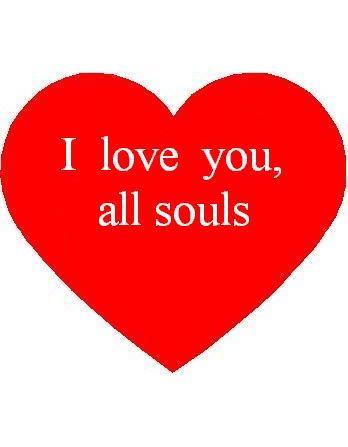 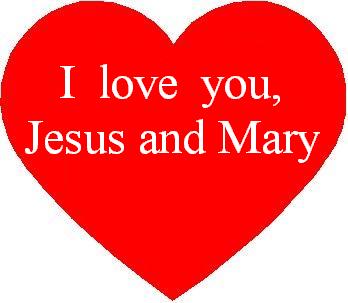 |
Question for married couples and others in intimate
relationships:
Q: How do I feel we can share our feelings more lovingly?
Table of Contents
Previous Daily Message
Main Shepherds of Christ Page
 Copyright
© 2000 Shepherds of Christ.
Copyright
© 2000 Shepherds of Christ.
Rights for non-commercial reproduction granted:
May be copied in its entirety, but neither re-typed nor edited.
Translations are welcome but they must be reviewed for moral and theological accuracy by a
source approved by Shepherds of Christ Ministries before any distribution takes place.
Please contact us for more information.
All scripture quotes are from the New Jerusalem Bible, July 1990, published by Doubleday.
Revised: December 4, 2000
URL: http://www.SofC.org
Contact Information for Shepherds of Christ
Email: info@SofC.org
Shepherds of Christ Ministries
PO Box 193
Morrow, Ohio 45152-0193
Telephone: (toll free) 1-888-211-3041 or (513) 932-4451
FAX: (513) 932-6791

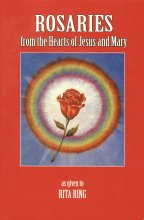

























 Mary's
Message from the Rosary of August 27, 1996
Mary's
Message from the Rosary of August 27, 1996

